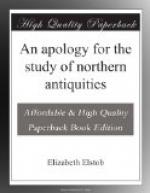But it seems you are not of so much Credit with these Gentlemen, who question your Authority, and have given a very visible Proof of their Ingenuity in an Instance which plainly discovers, that they cannot believe their own Eyes.
The Saxons, say they, if we may credit Dr. Hickes, had various Terminations to their Words, at least two in every Substantive singular: whereas we have no Word now in use, except the personal Names that has so. Thus Dr. Hickes has made six several Declensions of the Saxon Names: He gives them three Numbers; a Singular, Dual, and Plural: We have no Dual Number, except perhaps in Both: To make this plainer, we shall transcribe the six Declensions from that Antiquary’s Grammar.
I would ask these Gentlemen, and why not credit Dr. Hickes? Is he not as much to be believ’d as those Gentlemen, who have transcribed so plain an Evidence of the six Declensions to shew the positive Unreasonableness and unwarrantable Contradiction of their Disbelief? Did he make those six Declensions? or rather, did he not find them in the Language, and take so much pains to teach others to distinguish them, who have Modesty enough to be taught? They are pleased to say we have no Word now in use that admits of Cases or Terminations. But let us ask them, what they think of these Words, God’s Word, Man’s Wisdom, the Smith’s Forge, and innumerable Instances more. For in God’s Word, &c. is not the Termination s a plain Indication of a Genitive Case, wherein the Saxon e is omitted? For example_, Godes Word, Mannes Wisdom, Smi[dh]es Heor[dh]. Some will say, that were better supplied by his_, or hers, as Man his Thought, the Smith his Forge; but this Mistake is justly exploded. Yet if these Gentlemen will not credit Dr. Hickes, the Saxon Writings might give them full Satisfaction. The Gospels, the Psalms, and a great




